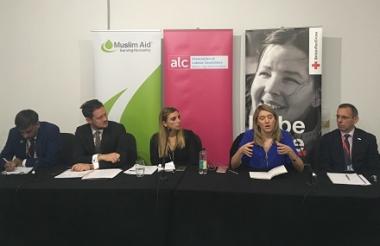The British Red Cross has called for more collaboration between charities and statutory authorities in their emergency response planning, during a fringe event at the Labour Party Conference yesterday.
Speaking at a fringe event yesterday, Simon Lewis head of crisis response at British Red Cross, said there is a “postcode lottery” for charities around whether they are included by statutory authorities in planning for emergency responses.
He said: “I think it is also about statutory agencies sometimes being more accepting of the voluntary sector. In some ways it feels a bit like a postcode lottery.
“In some local authorities where there is a local resilience forum, and you have planning groups with police, fire ambulance services and the voluntary sector, it works perfectly, whereas in others it is really poor.
“So we really need to work better at making sure that statutory agencies and those local resilience forums get it because it is so important to involve the voluntary sector.”
Collaboration framework
Lewis talked about the slow response to the Grenfell tragedy from local organisations, which he said was due to voluntary organisations not collaborating well enough.
He said: “We saw organisations like Muslim Aid and Islamic Relief but also very small community groups who had nothing to do with emergency response in their daytime role who were responding and meeting the needs of people and we missed that.
“We didn’t see that coming. We have now recognised that community engagement is key to us.
“That’s what we started doing probably a little too late, 14 hours into Grenfell. We stepped out of that statutory agency rest centre where the footfall was tiny and the community around Grenfell were not coming.
“So we started running pop-up surgeries in mosques and churches, in the public spaces where people were.”
Lewis and Jehangir Malik, chief executive of Muslim Aid, talked about work the Charity Commission is now doing to improve collaboration and prepare better for future emergencies.
Lewis said: “We are working with Jehangir’s team and many other small voluntary sector organisations and umbrella groups with the Charity Commission to better coordinate the voluntary sector and community groups including those groups that wouldn’t normally involve themselves in an emergency in a strategic way.”
Emergency volunteer scheme
Lewis said the British Red Cross set up a “community reserve volunteer scheme” late last year, which involves members of the public being alerted when an incident happens near to them.
The charity sends a text message to all the volunteers who have signed up to the scheme in the area near the incident and will respond if they are able to help.
Lewis said: “There is no expectation. But we will know how many have said yes and when we have got the number we want we will give them a rendezvous point and a team leader, who can be staff or a volunteer, will manage them.”
He said that 6,000 people had signed up already in the UK, but the charity aims to match the 35,000 that have signed up to Netherlands Red Cross’s version of the scheme.









